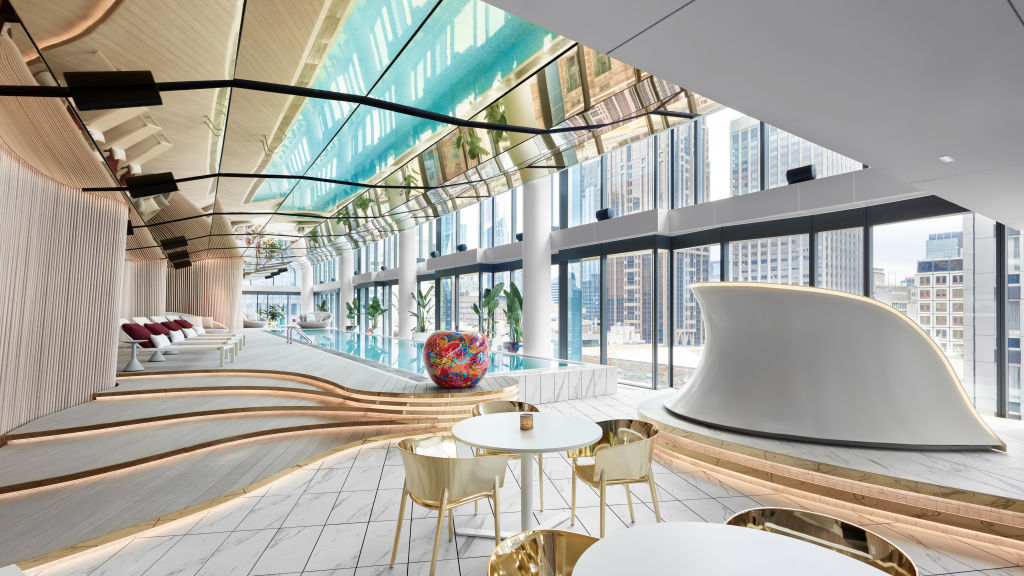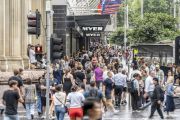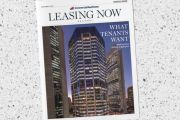
Travel is back but hotels still face last-minute bookings and critical staff shortages
Leaders of the pandemic-ravaged Australian hotel industry have learned huge lessons in the past two and a half years of seeing their business decimated and say they’re emerging wiser, stronger and more determined to recover lost ground.
“It will get better, it has to get better, it must get better,” David Mansfield, the vice-president and managing director of the Accommodation Association, told a seminar held by the NSW Property Council on Thursday. “And it will happen.
“Investment in the long term and medium term of our industry has been firm; we’ve had new hotels coming to the market, and now the international borders are lifting. Travel is critical to the world’s wellbeing. We need to travel; it’s good for our minds. We all yearn for emotional experiences, and that’s why our industry is going to get bigger and better. It’s going to take off.”
COVID-19 devastated hotel markets across Australia, particularly with international borders closing, hard state borders and extended lockdowns in Melbourne and Sydney. The monthly 800,0000 international visitors to Australia and their $3 billion spend vanished overnight.
Since then, occupancy rates have been down in the 20 per cent range, according to a recent report by Deloitte Access Economics, Tourism and Hotel Market Outlook.
It predicted that the pace of recovery for hotels would vary across the city markets, proving stronger in Brisbane, Perth, the Gold Coast, Canberra and Darwin by 2023. Sydney and Melbourne’s bounce-back would take longer, largely due to their high pre-pandemic occupancy rates, their greater dependence on demand from international tourists and corporate travellers, and significant new supply coming online.
New hotels have included the W Hotel and Hyatt Centric in Melbourne, the Hotel Kimpton Margo in Sydney, Sofitel opening in Adelaide and The Marriott’s The Tasman in Hobart.
Yet, Mr Mansfield said, even on the eve of international borders reopening, there are still enormous challenges, like spiralling construction costs for the sector, supply disruption, the appetite now from customers for last-minute bookings rather than planning ahead, and, perhaps even more importantly, critical staff shortages.
His words follow the Property Council of Australia’s call for more skilled and tailored migration to be welcomed by the NSW government to further train and promote domestic hospitality jobs to help with skill shortages across the hotel and hospitality industry.
In a situation pre-pandemic, where 15 per cent of all hospitality staff across Australia were visa-holders, it would be vital to ensure hotels could continue to service travellers. “Travel and tourism may be up as global levels of wealth increase, but there are fewer qualified hospital workers across the entire industry, from casinos and cruise ships to restaurants and hotels,” said Luke Achterstraat, the Property Council’s NSW executive director.
“Australia’s reliance on migration is all too apparent. As unemployment reaches 4 per cent and Australia’s job market explodes with activity, our hotels, restaurants, cafes, bars and clubs across our great cities are left to suffer.”
As a result, there now needs to be a lot more focus on presenting hospitality as an excellent career for people and to make sure talent is fostered, nurtured and encouraged, said Mr Mansfield.
Margy Osmond, the Tourism and Transport Forum chief executive, said: “We need to bring people in on this vision, and we need the backpackers back. We have lost a whole generation of highly skilled future leaders.”
While the industry had used the pandemic experience to grow stronger in the future, with collaboration between the different sectors, Australia still has something of a brand issue overseas, particularly in parts of Asia, she said. In addition, two of our biggest markets aren’t coming – China isn’t travelling, and New Zealand remains shut off for the time being – while too many local travellers are putting off travel, believing it to be too complicated.
Yet, specific trends are now appearing for the future, according to Marie Colangelo, project director of hotels at JLL Australia. They include the personalisation of services, design-led products, consideration of sustainability and the use of technology to maximise experiences.
Many hotels have also used the hiatus to upgrade their offering and renovate ageing stock. With regional travel remaining strong, and people discovering more of Australia all the time, that’s something that’s happening particularly in the regions.
“There are lots of new hotels coming in the regions, and that’s putting pressure on existing hotels,” said Ms Colangelo. “A lot of owners have diminished income, but there’s a place for a really considered refresh. A lot are looking at improving food and beverage and offering external dining and becoming more leisure-focused.”
Before the pandemic, there were the beginnings of a change in both corporate and leisure travel to much more experiential travel, said Peter Hill, director of development at Event Hospitality and Entertainment. New brands of hotels are now entering Australia and shaking up the market, too.
“That’s particularly exciting,” he said. “The desire for experiences is driving a lot of food and beverage, and there’s a real focus now on restaurants, which COVID stalled for a little while, but we’re now on the cusp of enjoying pretty strong growth.”
Business travel is becoming much more discerning as a result, believes Mark Holmes, chief operating officer at Crown Sydney. “People want a lot of experiences, and we see that feedback from the market,” he said. “It’s exciting to see people excited about going back to hotels.
“There’s definitely positivity in the market generally. The leisure market is being a key driving factor. We’re seeing hundreds of inquiries coming through, and people want to know rates for bookings next year rather than in the short or medium term. And experiences are what everyone is after.”
Get a weekly roundup of the latest news from Commercial Real Estate, delivered straight to your inbox!






